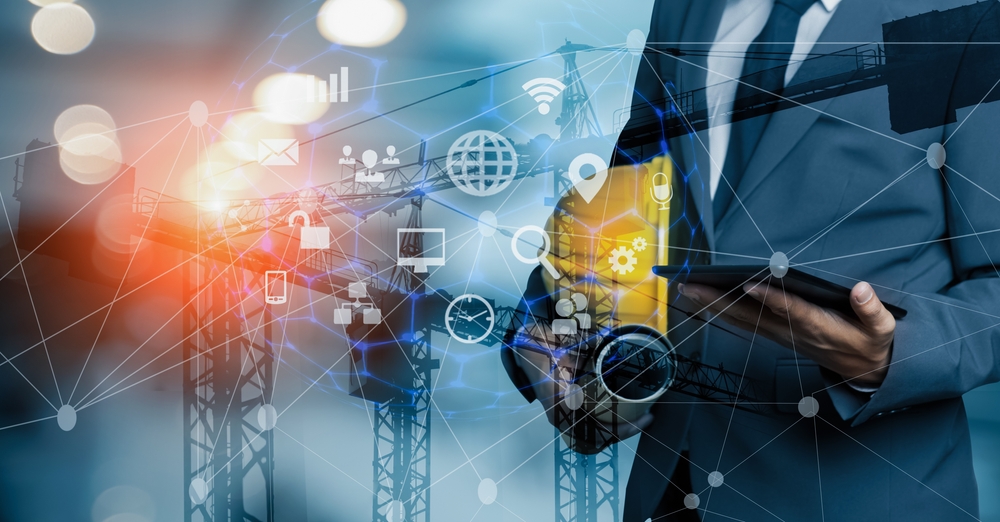By Mohamad Itani, CSMO at United Real Estate (URC) – Prior to that, he was the CEO of Esrar Real Estate, a specialized sales & marketing real estate consultancy firm working in Saudi Arabia (KSA) and the region. Regarded as a seasoned real estate professional & consultant, his services extend to several countries including Malaysia, Indonesia, Maldives, Turkey & Spain.
Itani’s diverse engagement in various countries enabled him to gain in-depth knowledge of the local, regional, and global real estate industry. He has successfully planned & launched master-planned communities in different countries. He regularly writes real estate articles covering GCC market.
_______________________________________________________________________________________________________________
Digitalisation has become one of the critical business aspects for achieving success and competitive advantage. Multiple industries are focusing on making their businesses more digitalised. The real estate industry of Dubai has also implemented digitalisation to increase operations efficiency. Dubai is making leaps towards the digitalisation of the real estate market while becoming a leader in the digital economy space among the states in the world. The current articles provide insights on the aspects that investigate how Dubai is digitalizing its real estate market.
How Dubai Digitalising the Real Estate Market
The study conducted by Treleaven et al. (2021) highlighted that Dubai’s real estate sector is focusing on launching an online sales system associated with its E-Law. The study’s outcome further highlighted that digitalization of real estate transactions would convert the traditional costly and labour-intensive procedures of property purchases management of sales into a more simple, convenient, and quick process. Through this, the customers in Dubai can purchase the property through digital means, but the customers overseas can also be attracted to invest in Dubai real estate. Furthermore, another research was conducted by Sohil and Alzoubi, (2019) that explored the impact of real estate digitalisation on the financial aspect of the industry. The study conducted interviews with different real estate CEOs working in Dubai. The responses collected depicted that digitalising the information-intensive procedures within real estate can reduce the cost by up to 90%. Along with this, another benefit of digitalisation is time-saving and reducing the burden on the employees. Furthermore, the real estate sector of Dubai, as highlighted in the study by Sabri (2021), is adopting Artificial Intelligence (AI) and Machine Learning innovation and technology for converting the conventional real estate market into the digital one.
Successful Digital Transactions within the Real Estate Sector
The research by Saull et al. (2020) highlighted that the real estate sector is focused on assessing the potential of digitalisation such as “property passports,” “Blockchain,” along with “Automated Valuation Models.”It is observed that implementing these digital innovations results in cheaper, successful, and faster transactions. The study’s outcome highlighted that the property passport is considered the most successful technology for successful digital transactions in the Dubai real estate sector. Moreover, the UAE real estate sector, including Dubai, has recently reported developing a Real Estate Self Transaction (Rest) Platform. This has been evaluated to possess significant advantages through which the industry can benefit. The platform is considered a testament to Dubai’s government’s commitment to offering a digital economy.
Furthermore, another study was conducted by Wouda and Opdenakker (2019) that explored the impact of digital technologies such as AI, ML, and Blockchain on speeding up the real estate transaction process. The study concluded that there are multiple bottlenecks within the real estate transaction processes, including a lack of structure within the data and quality issues. However, the digitalisation framework adoption can help in minimising these challenges and speed up the overall transaction process.

As highlighted in the report by Esber, (2022), the criticality of the digitalisation technology for the successful growth of the real estate sector was recognized way before by the government of Dubai compared to the rest of the world. Sheikh Hamdan bin Mohammed, the crown prince of Dubai, launched a platform referred to as RE-TECH in the year 2021. This boosted the investors’ confidence in the Dubai real estate sector. Along with this, Redlein and Höhenberger(2020) concluded that the digitalisation of processes and operations within the real estate sector of Dubai is considered revolutionary. Since none of the governments worldwide has focused on transforming their economy to innovative digital means as Dubai has focused on. Dubai aims to become a digital economy as they believe that the coming era is only of digitalisation. If they do not increase the pace, they will lack behind other world economies.
Results and Discussion
Digitalisation Changing Traditional Real Estate Methods
The real estate market of Dubai is one of the biggest markets that hold a lot of potential for investors and start-ups. Digitalisation is transforming the traditional methods through which the business operates in Dubai’s real estate market. As highlighted in the study by Wouda and Opdenakker, (2019), the digital structure of transactions within the real estate can improve how various assets are analysed. Along with this, the evaluation of the result obtained from analysing the studies depicted that through Blockchain technology, the real-estate can structure their physical and contractual information and data in one place. This ensures the quality and security of the data being used simultaneously.
Furthermore, on the analysis of the Re-Tech platform of real estate, digitalisation is being done in Dubai. This system incorporates databases through which reliable mapping of the future of Dubai’s real estate sector is expected to be achieved. Through the literature analysis, it was analysed that the Real Estate Self Transaction (Rest) platform provides an opportunity to pioneer the digital transaction in an administration-intensive sector.
Artificial Intelligence (AI) and Machine Learning (ML) as Forms of Digitalisation in Real Estate
The aspect of AI and ML results in more transparency of the real estate processes and operations within the market of Dubai. This aspect was evident in the research by Ionaşcu and Anghel(2020); upon analysis, it was concluded that the errors within the processes could be determined through transparency. Thus the efficiency of the business can be improved. On the other hand, through the evaluation of the studies, it was obtained that AI and ML enable the real estate to make accurate market projections and increase the accuracy of property investment.

Along with this, it was also presented in the study by Fields and Rogers(2021) that ML, Blockchain, VR, and AI, along with other digitalisation technologies, enable efficiencies, reduces the cost overruns, meet the supply and demands, timely delivery all of these ultimately increases the profit of the businesses within the real estate market. Some of the digitalisation of the real estate market include automated apartment matching, virtual home tours through the implementation of VR, rental portals, site management, and solutions for home loans and payments (Meyerhoff Nielse and Mahmoud Ali, 2021). In contrast, the methods of purchasing, selling, managing, and leasing property have become far more accessible through the adherence to digitalisation in Dubai’s real estate market.
The current research article explored the aspects of digitalisation within the real estate sector of Dubai. It was analysed that artificial intelligence, Machine Learning, Blockchain, and Virtual Reality are the significant aspects that the real estate sector of Dubai has adopted. The results obtained highlighted that new technologies and innovations within real estate provide the opportunity to increase the productivity and efficiency of the real estate processes. This is achieved by incorporating databases that help present the future trends and challenges that the market might face.
This allows the business to develop strategies beforehand that can help handle the challenges. Along with this, the data obtained through digitalisation allows focusing on the property needs and requirements that people are looking for while buying or investing in a real estate unit. Virtual reality is beneficial, and it provides an enhanced home touring experience to the customers. However, it was analysed through the evaluation of the literature that multiple more researches are required to highlight the proper manner in which Dubai’s real estate is shifting to digitalisation.




